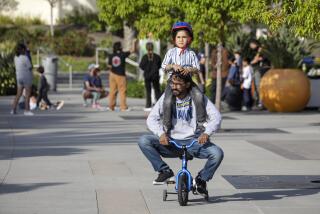Hard Separations
NORTHRIDGE — During the height of the war in Kosovo, Hazir Vlashi was forced to make a life-changing decision.
Vlashi and his family are ethnic Albanians. They were being pushed from their hometown in southern Kosovo by Serb police and military troops at the outbreak of the NATO air war against Yugoslavia.
Vlashi was faced with keeping his wife and four children in the small, war-torn border town or sending them to live with relatives in Los Angeles under a NATO resettlement program.
“I made up my mind to stay with my people,” Vlashi said during an interview in his Roscoe Boulevard apartment this week.
“To be separated from family is a very difficult thing,” he said through an interpreter, “but to be separated from a nation is even more difficult.”
To give in to Serbian aggressors would be the final blow to the family’s dignity. Vlashi had already been pushed out of his job as a sales manager at a Styrofoam company and forced from his newly redecorated home.
In May, Vlashi sent his wife, Fatime; daughters Lumnije, Ganimete and Fitore, and son Besnik to a tented border camp in Macedonia. They later boarded a plane bound for Los Angeles International Airport.
Upon arrival, the Vlashis were greeted by cousin Hajrush Vlashi, a waiter, and his wife, Renee, a college student, of West Hills.
The couple had arranged for 22 family members to come to Los Angeles through the resettlement program with the help of the Jewish Federation/Valley Alliance, which found host homes to take in all the Vlashi relatives.
Hazir Vlashi’s immediate family wound up in an upscale Calabasas home of Steven and Bobbie Black and their four children. The Vlashis stowed all their possessions in a hall closet: three small carry-on bags, a few shirts and a three thin jackets.
Meanwhile, Hazir Vlashi remained in Kosovo to face an existence that he likened to “what happened during World War II and the Holocaust with the Jews.”
“The purpose was not to displace a people,” he said, referring to what he called the systematic attack on ethnic Albanians, “but to vanish the whole existence of a people from the face of the earth.”
Although he was reluctant to speak specifically about the atrocities in Kosovo, Vlashi did say knowing his family was safe in America during the conflict gave him “peace in my spirit.”
It was only after hundreds of camouflage NATO military vehicles streamed into Kosovo June 12 in the first phase of the Western alliance’s peacekeeping effort that Vlashi considered joining his family in America.
“At that point, I thought my country was not in danger from the gloomy voices and crazy thinking of [Yugoslav President Slobodan] Milosevic,” he said.
*
Back in Los Angeles, Vlashi’s family had found an apartment in Northridge, registered for English classes and made the rounds of various government and social service agencies.
Once they knew their father would be joining them in their new home, the Vlashis, and the Blacks, got busy. They feverishly solicited the Hebrew Immigrant Aid Society and Rep. Brad Sherman (D-Sherman Oaks) for assistance in successfully navigating the maze of bureaucratic red tape.
Before leaving Macedonia on Aug. 1, Vlashi said he returned to his home in Kosovo for one last look. What he found shook him to the core: a ransacked home with one bedroom smeared with blood and pockmarked with bullet holes.
Like his family before him, Vlashi arrived with little but the clothes on his back. Yet in his hand he carried an embroidered tablecloth and a box of chocolates for Bobbie Black--thank you gifts for taking care of his family.
When he arrived in Los Angeles, Vlashi said he was overcome with joy and love for both his family and the Blacks who met him at the airport.
“I can’t find words to describe how I feel,” Vlashi said, looking at his wife and children. “People have big moments in their lives--marriage, prom parties, birth of children--but this is the biggest of all.”
More to Read
Sign up for Essential California
The most important California stories and recommendations in your inbox every morning.
You may occasionally receive promotional content from the Los Angeles Times.










